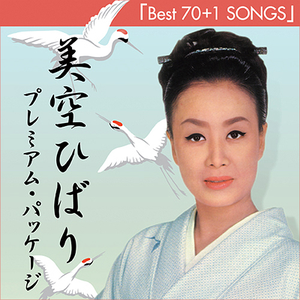In April of 1987, on the way to a performance in Fukuoka, she suddenly collapsed. Rushed to hospital, she was diagnosed with bilateral femoral necrosis brought on by chronic hepatitis. Until August she was confined to hospital and eventually showed signs of recovery. She commenced recording a new song Midaregami in October, and in 1988 performed at a concert called Fushichou konsaato (Phoenix Concert) at the Tokyo Dome. Against overwhelming pain in her legs, she performed a total of 39 songs while assuring her fans that she had completely recovered. However, on 24 May 1989, having been re-admitted to the Juntendou hospital in Tokyo, she died from interstitial pneumonitis at the age of 52.
In July 1989 after her death, she became the first female recipient of the National Prize of Honour (国民栄誉賞) for her longstanding contributions to the music industry.
In 1993, the Misora Hibari-kan opened in Arashiyama, Kyoto. Its popularity with fans and tourists has endured through to the present.
Her most famous song, "Kawa no nagare no yō ni," (1989) was voted #1 in a 1997 NHK poll of the best Japanese songs of all time.
越後獅子の唄
美空ひばり Lyrics
Jump to: Overall Meaning ↴ Line by Line Meaning ↴
山が見えます ふるさとの
わたしゃ孤児(みなしご) 街道ぐらし
ながれながれの 越後獅子
今日も今日とて 親方さんに
芸がまずいと 叱られて
撥でぶたれて 空を見あげれば
うつや太鼓の 音さえ悲し
雁が啼く啼く 城下町
暮れて恋しい 宿屋の灯
遠く眺めて ひと踊り
ところ変れど 変らぬものは
人の情の 袖時雨
ぬれて涙で おさらばさらば
花に消えゆく 旅の獅子
These lyrics are from the traditional Japanese folk song "越後獅子の唄" ("Echigo Jingasa Bushi"), as interpreted by the legendary singer Hibari Misora. The song is sung from the perspective of an orphan girl living as a wandering entertainer. The first verse describes how she is able to see the mountains of her hometown when she stands on her head while listening to the flute. She travels the highway performing as a lion dancer, which is a traditional performance where a dancer wears a lion costume and performs acrobatics to the sound of drums and bells.
The second verse describes how the girl is scolded by her supervisor, or "oyakata," for not performing well. When she looks up at the sky after being struck with a drumstick, she sees the moon and cries. The third and final verse describes a scene in a castle town where geese cry, the sound of the taiko drums is sad, and the lights of an inn are glowing in the twilight. The girl watches from a distance and dances alone, feeling the weight of the sadness and the transience of her traveling lifestyle.
The lyrics of "越後獅子の唄" are not about a specific person or event, but they capture the emotions and experiences of the traveling performers who used to roam the highways and perform in the towns and countryside of Japan. The song has become a part of Japanese cultural heritage and is often performed at festivals and events.
Line by Line Meaning
笛にうかれて 逆立ちすれば
If I stand on my head while listening to the flute music, I can see the mountains of my hometown.
山が見えます ふるさとの
I can see the mountains of my hometown.
わたしゃ孤児(みなしご) 街道ぐらし
I am an orphan, wandering the roads.
ながれながれの 越後獅子
I am like the flow of the Echigo lion dance, constantly moving forward.
今日も今日とて 親方さんに
Today, like any other day, I am scolded by the master.
芸がまずいと 叱られて
I am scolded for my performance being inadequate.
撥でぶたれて 空を見あげれば
I am beaten by drumsticks and when I look up at the sky,
泣いているよな 昼の月
I feel like crying at the sight of the daytime moon.
うつや太鼓の 音さえ悲し
Even the sound of the echoing drums makes me feel sad.
雁が啼く啼く 城下町
The sound of wild geese crying echoes throughout the castle town.
暮れて恋しい 宿屋の灯
As the sun sets, the light of the inn becomes more precious to me.
遠く眺めて ひと踊り
I watch from afar as people dance.
ところ変れど 変らぬものは
Although things may change, some things remain the same.
人の情の 袖時雨
People's feelings are like a rain that falls gently on sleeves.
ぬれて涙で おさらばさらば
Soaked in tears, I say farewell.
花に消えゆく 旅の獅子
Like a lion depicted on a journey, I disappear into the flowers.
Writer(s): 西條 八十, 万城目 正, 西條 八十, 万城目 正
Contributed by Claire T. Suggest a correction in the comments below.

@taiyoarata6763
国宝であるのは間違いない。未来永劫の歌声。
@user-lh9rg2gy3s
僕の母も、美空ひばりさんのファンで、この曲が良いといってました。もう母が亡くなって35年になります。
@ytbprem592
亡くなった母親の昭和初期の苦労話を思い出して、涙が出てしまいました。
@user-lx4dw8ww9g
こどもの頃に聞いた懐かしい歌です🙎
@user-pj2zr9cx3x
この声が、聞こえて、きたとき 懐かしさで、いっぱいでした、今でも、これからも、ひばりさんが、いちばんです。乱れ髪まで、沢山の歌声を、ありがとう
📲の 妻です。
@sayusayu8874
ひばりさんの日本語の美しさが光ります。
なかでもガ行の発音がとても綺麗です。
ひばりさんは歌詞を大事にする人ですね。
@user-zj9zx9wl8q
小学生の合唱部の頃、姉にが行はがぁ、ぎぃ、ぐぅ、げぇ、ごぉ、と言うくらいの発声するときれいに聞こえるよと、教えられました。
@user-ed2zq6uk7p
4番のところ変われど変わらぬものは。ここが1番好きです。小さい頃よく歌ってました。
@user-pj2zr9cx3x
やはり、この頃の、歌声が、いちばん、いいですし、懐かしいです。昭和時代を、元気付けたね。
@user-gp3jw2fj9q
ひばりは私より一つ上で子供の頃の歌は上手いですね、早死にでしたね私はまだしぶとく生きています米寿迄は、頑張ります